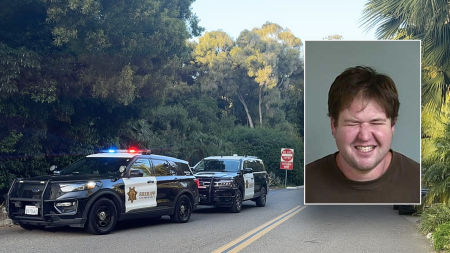The final days of Multnomah County District Attorney Mike Schmidt’s term are marked by controversy as he seeks to reduce the sentences of several violent criminals, including a convicted murderer. This move has sparked outrage from his successor, District Attorney-elect Nathan Vasquez, who criticizes the petitions as a “last-minute giveaway” for individuals who committed “horrible crimes.” Schmidt, a Democrat voted out of office on Election Day, defends his actions, claiming they align with his ongoing efforts to pursue justice and not just convictions. However, the timing and nature of these petitions raise concerns about potential political motivations and the impact on victims and public safety.
Among the most contentious cases is that of Frank Swopes Jr., convicted of felony murder for the death of 75-year-old Jean Stevenson during a 1993 home invasion. Swopes Jr. also committed a subsequent violent robbery against a 76-year-old woman, tying her up, terrorizing her, and sexually assaulting her. He has served 32 years of a 35-year sentence. Schmidt’s petition seeks to reconsider Swopes’ sentence, potentially leading to his release. This move has drawn sharp criticism, given the brutality of Swopes’ crimes and the potential danger he poses to the community.
Another controversial case involves Shane Ebberts, who pleaded guilty to first-degree and second-degree assault for a brutal 1995 attack on two college students. Ebberts, 17 at the time, and an accomplice used a baseball bat and mallet handle to attack the students, leaving one with a fractured skull. Although Ebberts has already served his 7 ½ year sentence, Schmidt’s office is petitioning to allow him to withdraw his guilty pleas and plead to a lesser charge, potentially allowing him to expunge the crime from his record. The victims strongly oppose this move, emphasizing the lasting physical and emotional trauma they have suffered due to the attack.
The timing of these petitions, just days before Vasquez takes office, further fuels the controversy. Vasquez, a Republican-turned-independent who campaigned on a tough-on-crime platform, has publicly criticized Schmidt’s actions, arguing they undermine the justice system and disregard the suffering of the victims. He emphasizes the seriousness of the crimes committed by these individuals and the potential risks their release poses to public safety. The stark contrast between Schmidt’s and Vasquez’s approaches to criminal justice underscores the ongoing debate over sentencing reform and its implications for communities.
Schmidt maintains that these petitions are consistent with his overall approach to justice and have been thoroughly reviewed through an established process involving a community advisory board. He argues that his office strives for more than just convictions but also seeks to achieve equitable outcomes. However, critics question the timing and selection of these particular cases, suggesting they may be politically motivated or influenced by a desire to leave a specific legacy. The lack of transparency surrounding the petition process further exacerbates these concerns.
The controversy surrounding Schmidt’s last-minute petitions highlights the complex and often contentious nature of criminal justice reform. While proponents of reform argue for a more rehabilitative approach that emphasizes reducing recidivism and addressing underlying causes of crime, critics express concerns about public safety and the rights of victims. The cases of Swopes Jr. and Ebberts represent the difficult balancing act between seeking justice for victims and offering opportunities for rehabilitation. The conflicting perspectives surrounding these petitions underscore the need for ongoing dialogue and careful consideration of the potential consequences of such decisions. The ultimate impact of Schmidt’s actions remains uncertain, but the controversy surrounding them will undoubtedly shape the conversation about criminal justice reform in Multnomah County and beyond.








